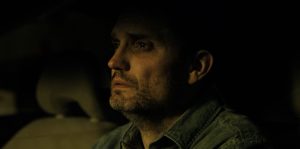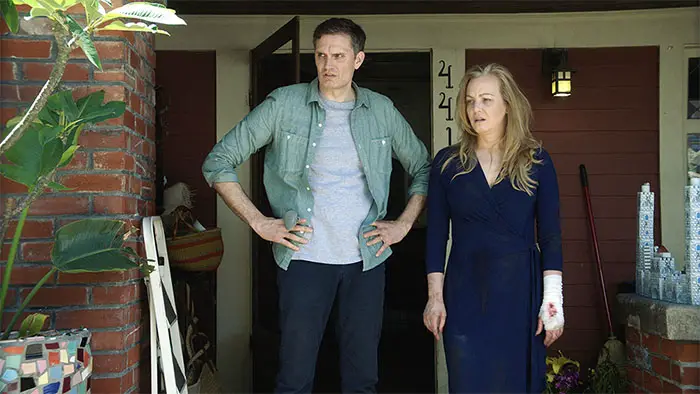
What was your philosophy of taking a role in so many independent films? Is it a matter of being able to get a lead or meatier role in an indie production? Why did you do so many?
My philosophy is simply to say yes to everything until you can’t. There was a year right after I graduated from Chapman University down in Orange County. I graduated in 2000, and in the year after I graduated, I was still friends with everybody in the film school and ended up being in like 45 or 50 students films in that one year.
You know, coming out of film school, the community that I met in and hung around with was super important to the trajectory of my career, for sure.
Where I am right now, I have done quite a bit work. I use this thing called the Active Pitch, which is a website. Instead of just your reel, you can put your stuff in each episode or film you’ve been in. There is a lot of stuff that I’ve done over the years so my managers can say, you know, he did this, and this and this, which is like that role you have in this.
When you did the 50 independent films, what acting muscle did you work out the most or work to your benefit?
Well, I think that when you’re in front of a camera on a regular basis you can think of each take as NOT being precious. What I mean by being precious is with each take, there’s an added weight to it. You also need to be fluid in front of the camera. If something happens, if there’s a mistake that’s made by the crew or by you or by a fellow castmate, that’s gold. You know? You’re trying to live private moments in public. The more comfortable you are in that relationship with the camera while relating to the truth of the scene and the people in the situations, and so on, it allows you to be less precious about each moment. And you can be there and be present.
And I imagine doing that on 50 separate projects would make that easier and easier.
Yeah, I guess but I’m constantly being challenged by this craft and life. I’m grateful for all the experience in my head now but I feel like I have a s**t ton to learn all the time. I still love this job so much. I learn so much about myself in every single role.
Well then, let me ask you about Chapman University. I know they recently built an entire building dedicated to filmmaking. What was your experience like at Chapman?
It was great. I loved it. I chose Chapman because I wanted to go to film school but I had never made a movie. I was a painter in high school so I submitted all of my paintings and they allowed me into the directing program. It was awesome. I was able to kind of get my feet wet and understand how to tell a story visually. Through that process, I ended up falling in love with being in front of the camera. In school, I was constantly approached by my friends to be in their films, and I was always the first one to show up and be like, I’ll do it. Oh, you want me to jump off this building and with no clothes! No problem!

“…they put a camera in our hands, and they let us go and shoot and try and fail.”
I think in terms of how Chapman helped me, it was from day one, they put a camera in our hands, and they let us go and shoot and try and fail. And succeed and fail and try and try and try and try and try. And so the numbers of opportunities that I had were countless.
All right, let’s conclude with Blush. Tell me about your role in Blush and then how you got involved in that project.
I founded a theater company with a bunch of friends called IAMA Theatre Company. We’ve probably done 40-something productions for around 12 years. Through that experience, I ended up doing a play called The Dog’s House. Debra Eisenstadt came to see it and with her friend, Zeke Farrow. They liked the play and my work, so they called me in for an audition. I went in and read for Debra’s third film called Before the Sun Explodes. So I got an excellent little role in that film, and then that turned into a friendship and a working relationship, all building towards this next project, Blush.
We did several readings. I think I did maybe two or three readings of it. From 2016 to 2019, we did readings of Blush. I’m just a fan of Debra’s, and I think what she’s doing in terms of independent film is so cool. She’s fierce and what a warrior she is. She’s making movies for nothing and doing it all herself. She’s just a warrior.
Blush is such a fantastic film too. I think it’s tight overall. With an unexpected insight, especially in Wendy’s character, that is just, is just so rich and so deep too.
Yeah. She’s really terrific. It was fascinating at Sundance. Those theaters were packed middle-aged women. We’d stand there at the Q and A’s, and sometimes there weren’t even questions. It was just “thank you for making this movie.” As an actor in theater, you get that experience of getting instant feedback from an audience. After you do a few shows, you can gage that connection. What was so rewarding about this was seeing that same response from a movie. Where most of the time, in film and television, you don’t get a chance to actually talk with people immediately. That was really cool.
From the crowd, what was the response to your character?
There wasn’t much attention on it. It was mostly Wendy. Though I believe my character is just desperate for connection and, you know, he’s so aching to feel connected to his son and his wife. Then somebody gives him a taste of the catnip, and I think he had been aching for that.
